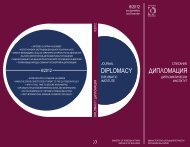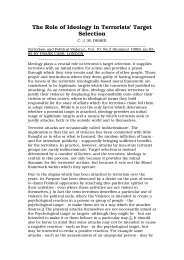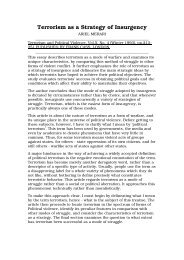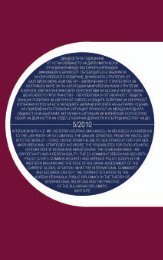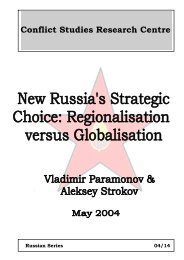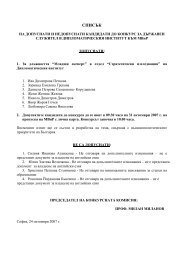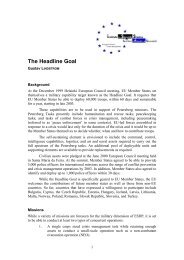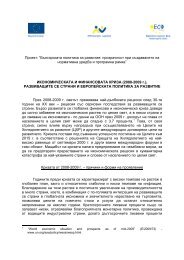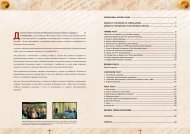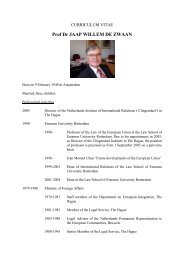The Myth of Ethnic Conflict: Chap 13 - Diplomatic Institute
The Myth of Ethnic Conflict: Chap 13 - Diplomatic Institute
The Myth of Ethnic Conflict: Chap 13 - Diplomatic Institute
You also want an ePaper? Increase the reach of your titles
YUMPU automatically turns print PDFs into web optimized ePapers that Google loves.
508 Maria Todorova<br />
100,000 are Pomaks and 200,000 gypsies (see Elena Trifonova, “Yakoruda—<br />
Golyamoto chakane za edna istins,” Standart, 20 April 1993). Konstantinov<br />
(“An Account <strong>of</strong> Pomak Conversions,” p. 344, n. 3) cites 270,000 Pomaks<br />
as an <strong>of</strong>ficial figure <strong>of</strong> the Ministry <strong>of</strong> Interior by May 1989 but does not<br />
disclose his exact source.<br />
64. Yanora Grigorova and Yasen Borislavov, “Bîlgarite v Yakoruda styagat<br />
neshto kato vîstanie,” Duma, 15 May 1993.<br />
65. Boika Asiova, “Yakoruda se poturchva spokoino,” Duma, 27 November 1992.<br />
According to the census rules, children over 16 determine their ethnic characteristics<br />
themselves; under this age, it is the prerogative <strong>of</strong> their parents.<br />
66. Grigorova and Borislavov; Trifonova.<br />
67. Ibid.<br />
68. Grigorova and Borislavov.<br />
69. Trifonova.<br />
70. <strong>The</strong> IMRO, which had enjoyed a state-within-a-state status in Bulgaria<br />
following World War I and had terrorized the political life <strong>of</strong> the country<br />
in the interwar period, was banned after the military coup <strong>of</strong> 1934. It was<br />
revived after the fall <strong>of</strong> communism in 1989. Despite its shrill and vociferous<br />
nationalism and its great wealth, the organization has not thus far engaged<br />
in any extralegal activities. <strong>The</strong> mayor <strong>of</strong> Yakoruda, Naile Salikh, blames<br />
the inflated reports <strong>of</strong> ethnic tensions in the municipality and the whole<br />
inflamed public debate exclusively on the leaders <strong>of</strong> the local branch <strong>of</strong> the<br />
IMRO (Nov Pirinskli vestnik, no. 60 [8–14 December 1992]).<br />
71. Prava i svobodi, no. 22 (28 May 1993), p. 3.<br />
72. Prava i svobodi, no. 24 (11 June 1993), p. 3.<br />
73. Mariana Kirova, “Turtsizirat se Yakoruda i gr. Gotse Delchev,” Demokratsiya,<br />
22 May 1993. A protest against the report <strong>of</strong> the parliamentary commission<br />
was filed by Naila Salikh and was published in Prava i svobodi, no. 26 (25<br />
June 1993).<br />
74. For different reactions to the parliamentary decision, see Zora, 30 September<br />
1993; 168 chasa, 26 September 1993; Duma, 29 September 1993.<br />
75. <strong>The</strong> information was gathered on a special card at the same time as the<br />
census data. <strong>The</strong> pollsters interviewed all males between the ages <strong>of</strong> 16 and<br />
59 and all females between 16 and 54. <strong>The</strong> results were published in<br />
Bezrabotni v republika Bîlgariya kîm 4.12.1992 godina (predvaritelni danni)<br />
(S<strong>of</strong>ia: National Statistical <strong>Institute</strong>, 1993).<br />
76. Ibid., p. 7.<br />
77. Ibid., pp. 11–12.<br />
78. After 1989 Bulgaria lost its traditional tobacco markets in Eastern Europe,<br />
especially the large market <strong>of</strong> the former Soviet Union, but also the markets<br />
<strong>of</strong> Poland and Hungary. At the same time, the local consumer market for<br />
Bulgarian cigarettes has shrunk fourfold because <strong>of</strong> the low tariffs imposed



